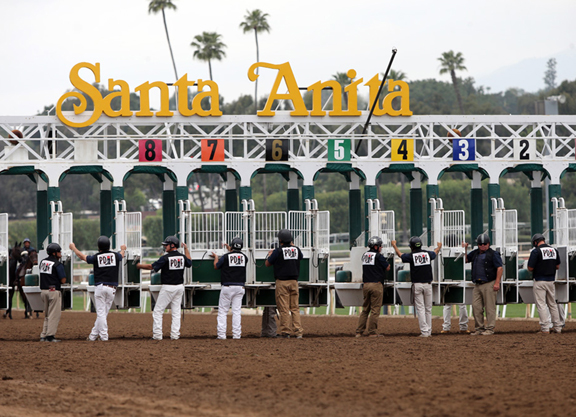By T. D. Thornton
Whether or not horse racing should continue at the state's tracks was not an actionable agenda item on Thursday's California Horse Racing Board (CHRB) meeting, but the topic came up early and often as COVID-19 concerns dominated the discussion.
The crux of the debate centered on Santa Anita Park and whether or not continuing to race without spectators present constituted an “essential business” exemption under the statewide stay-at-home mandate designed to slow the spread of the coronavirus outbreak.
The CHRB has allowed racing to continue with health-related restrictions at the state's tracks since the protective order was issued by the governor last week, but the board has also made it clear that the permissibility of racing could change at any time.
“I just want to make sure that we are making the best decisions for the state of California. I'm taking what the governor is saying very, very seriously,” said commissioner Wendy Mitchell. “I understand that everyone wants to get out and do their thing. I want to get out and do my thing, too. But that's not the time that we're living in.
“We're saying that there's an exception [for California tracks right now]. But other tracks around the country are shutting down,” Mitchell continued. “My comments are based on what is happening in the world, not on what our particular industry is suffering.”
Aidan Butler, the chief strategy officer and acting executive director of California racing operations for The Stronach Group (TSG), which owns Santa Anita and Golden Gate Fields, said that he didn't want to sound “alarmist.” But he underscored that the state would be risking dire consequences if the 750 backstretch personnel who work and live in Santa Anita's stable area were cut off from earning a living via racing's economic engine.
“First and foremost, we are very different than almost every other industry,” Butler said, noting how the horses have to be cared for and exercised on a daily basis regardless of whether money-making opportunities are going on. If protective health measures are in place, he postulated, why not give the Thoroughbred community the economic lifeline it badly needs by staging the races?
“Even before any orders or mandates, we have been closed to the general public. We've instituted protocols across all our tracks,” Butler said. “The optics of us racing while the rest of the world is at home, I understand, are terrible. But the context of how we're different, and how we're a very specialized industry that really is self-contained, needs to be explained.”
Butler gave the example of morning training, which might mean 1,200 horses per day at Santa Anita coming and going to the track from a very active backstretch. But for an afternoon of racing, that number is about 80, he said, which cuts way down on unwanted interactions among workers.
“There are far more people involved in a morning's training than in an afternoon's racing,” Butler said.
“The second we start to interfere with the ecosystem [by mandating that races cease], the knock-on effect becomes devastating,” Butler said. He later added, “As soon as we stop racing [most trainers] now get in jeopardy. The second they get in jeopardy, the first thing they will do, like every other business, is to start laying off their staff.
Butler continued: “We could end up with not only an animal welfare crisis, but a humanitarian crisis, because there is no need for the 750 people who call this place home to be here. At that stage, the city of Arcadia now has a problem with people with nowhere to be, and the horses have a bigger problem with no one to care for them.”
Butler was asked by a commissioner to speak to why Santa Anita isn't following the lead of other tracks nationwide that are shutting down. He answered by first referring to tracks that aren't currently racing, but have decided not to open their stabling yet for upcoming spring race meets.
“They don't want to find themselves in a position that we are currently in, with humans living on the tracks and humans needing to be funded to look after these horses,” Butler said. “You can't look at all tracks as the same. A lot of tracks that didn't need to be open are no longer open….. Gulfstream Park [which is also a TSG-owned track], is continuing to move forward and to try and get help from the governor of [Florida], because they understand the crisis that will ensue if we have to shut down racing.
“A lot of the other states that are solely reliant on [gaming] subsidies have already kind of shut up shop,” Butler said, noting that California tracks don't have that type of funding for purses, so being able to race and take bets is more economically vital.
Butler also pointed out that threats of evictions at racetracks–for both horses and humans–are becoming startlingly routine in the wake of the COVID-19 crisis.
“A lot of tracks out there have mandated that [backstretch personnel] get off the track. That's not a good solution, and unfortunately, the [spring meets that aren't opening] now means there is a shortage of places for these horses to be,” Butler said. “There are just not enough farms around any more to deal with the magnitude of animals that need to be looked after, so we're kind of stuck in a little bit of a rut here.”
Cliff Goodrich, the executive director for the California Thoroughbred Horsemen's Foundation (CTHF), which provides backstretch-based health care for horse workers, echoed Butler's sentiments about how a shutdown of racing would adversely affect horse personnel.
Goodrich said the CTHF backstretch health clinic at Santa Anita is funded through a portion of the betting, and if that revenue stream is cut off, the clinic will have to close.
“For better or worse, we have a closed community [on the backstretch],” Goodrich said. “If racing ceases, the day is far closer to that stable area shutting down, releasing [possibly infected] people into the community. And where are the horses going to go?”
Not a subscriber? Click here to sign up for the daily PDF or alerts.






